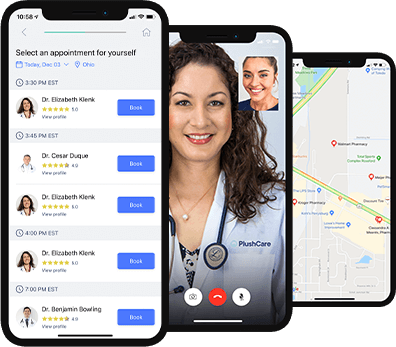Lung congestion, also known as chest congestion, gets the best of everyone at some point. We are all familiar with phlegmy coughs and labored breathing and we all hope to avoid it.
Unfortunately, for some, lung congestion will strike. It’s important to know the causes, symptoms and treatment methods so you can feel your best again.

1
Book on our free mobile app or website.
Our doctors operate in all 50 states and same day appointments are available every 15 minutes.
2
See a doctor, get treatment and a prescription at your local pharmacy.
3
Use your health insurance just like you normally would to see your doctor.
Lung Congestion Causes and Symptoms
There are many causes of lung congestion. Most commonly, lung congestion is a symptom of a lower respiratory infection.
When your trachea (windpipe) and/or lungs become infected with harmful bacteria or viruses, your body produces more mucus to trap and fight off these invaders. As a result, your lungs (and, sometimes, your nose) become filled with excess mucus that you cough up. Productive coughs are the main symptom of lung congestion.
Not all lung congestion is serious. Sometimes, a cold or allergies can cause excess mucus to drain from your nose into your throat, causing a cough. Other times, lung congestion can be indicative of bronchitis or pneumonia. If left untreated, bronchitis can spread from the bronchial tubes into the lungs, progressing into pneumonia.
“Early [viral pneumonia] symptoms are similar to influenza symptoms: fever, a dry cough, headache, muscle pain, and weakness,” according to the American Lung Association. “Within a day or two, the symptoms typically get worse, with increasing cough, shortness of breath and muscle pain.”
If pneumonia is left untreated, the lungs can fill with fluid and cause serious health risks, including death. It is very important to see a doctor if you think you have bronchitis or pneumonia to prevent the infection from worsening.
When To See a Doctor
Seek medical attention if:
You are suffering from lung congestion for more than 1 week
Your lung congestion grows progressively worse
You have trouble breathing
You are wheezing
Your congestion prevents you from sleeping
You cough up blood
You have a fever over 100° F
Lung Congestion Treatments
Luckily, there are many home remedies and medications that can help provide relief from lung congestion.
At-Home Treatments for Lung Congestion
Several at-home remedies can help treat lung congestion, including:
Drink lots of water. Staying hydrated helps thin mucus and makes it easier to cough up than thick sticky mucus.
Take hot showers and baths. The steam from hot water helps thin mucus from the outside in and makes it easier to cough.
Rest. Getting plenty of sleep and avoiding stress helps your body focus on fighting the bacteria or virus causing your lung congestion.
Over-the-Counter Medications for Lung Congestion
There are many over-the-counter medications that you can get at drug stores and pharmacies without a prescription. There are lots of options to eases coughing or to help thin and reduce congestion, including:
Dextromethorphan for suppressing cough (brand names: Triaminic Long Acting Cough, Robitussin Cough Long-acting, Vicks DayQuil Coughs, etc)
Guaifenesin for thinning mucus (brand names: Mucinex, Robitussin Chest Congestion)
Be sure to check with a doctor before taking over-the-counter medications to ensure they do not interfere with other medications you may be taking.
Prescription Medications For Lung Congestion
If you have a bacterial infection causing your lung congestion, such as bacterial bronchitis or pneumonia, you will likely need to take antibiotics to treat your lung congestion. On the other hand, if the cause of your lung congestion is viral, you may need an antiviral medication.
Antibiotics fight off the harmful bacteria that cause lung congestion, while antivirals fight off viral infections that can contribute to lung congestion. If your lung congestion symptoms persist after at-home remedies and over-the-counter treatment, be sure to talk to a doctor about your treatment options or to get an antibiotic medication.

1
Book on our free mobile app or website.
Our doctors operate in all 50 states and same day appointments are available every 15 minutes.
2
See a doctor, get treatment and a prescription at your local pharmacy.
3
Use your health insurance just like you normally would to see your doctor.
Just Lung Congestion or Something Worse?
Lung congestion can also be a symptom of something bigger than a lower respiratory infection. Some diseases and conditions cause increased respiratory infections or directly impact the lungs themselves.
Chronic obstructive pulmonary disease (COPD) is a serious disease that causes lung congestion. This disease causes the airways and lungs to become irritated and inflamed, making it harder to breathe. Shortness of breath only worsens with time. Smoking is the primary cause of COPD.
Pneumonia, as mentioned above, can also be very serious, especially for the elderly and those younger than 2 years of age. Pneumonia is a bacterial, viral, or fungal infection of the tiny air sacs in the lungs called alveoli.
When these become infected, it becomes harder to breathe, and excess mucus production leads to lung congestion. If it worsens and left untreated, pneumonia can be deadly. Consequently, it is crucial to see a doctor for early diagnosis and treatment.
Book an appointment with a PlushCare doctor today to find out what is causing your lung congestion and the best treatment methods for you.
Read More About Lung Congestion
Sources:
PlushCare is dedicated to providing you with accurate and trustworthy health information.
John Hopkins Medicine. Bronchitis. Accessed on July 11, 2021 at https://www.hopkinsmedicine.org/health/conditions-and-diseases/bronchitis
American Lung Association. Pneumonia Symptoms and Diagnosis. Accessed on July 11, 2021 at https://www.lung.org/lung-health-diseases/lung-disease-lookup/pneumonia/symptoms-and-diagnosis
Centers for Disease Control and Prevention. Chronic Obstructive Pulmonary Disease (COPD). Accessed on July 11, 2021 at https://www.cdc.gov/copd/index.html
U.S. National Library of Medicine. MedlinePlus. Dextrometorphan. Accessed on August 29.2021 at https://medlineplus.gov/druginfo/meds/a682492.html
U.S. National Library of Medicine. Guaifenesin. Accessed on August 29,2021 at



